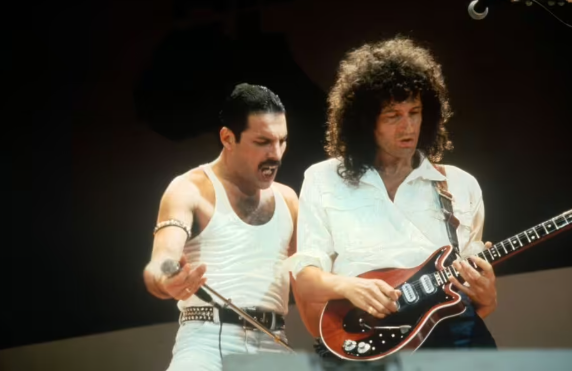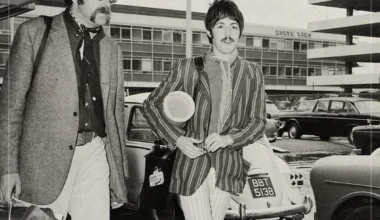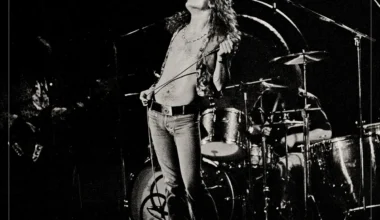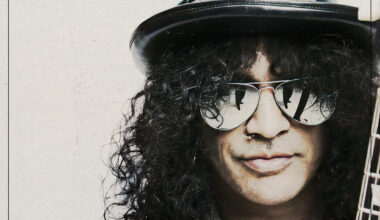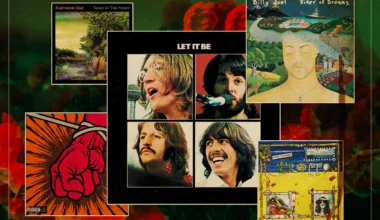On July 13, 1985, at 6.41pm in London, a momentous occasion took place. Freddie Mercury emerged on stage at Wembley Stadium, accompanied by fellow legends Brian May, Roger Taylor, and John Deacon.
The venue was packed with nearly 80,000 spectators, while a staggering two billion watched worldwide. Everyone present that day and over the past four decades concurs that Queen was the standout act.
With their natural affinity for stadium performances, an incredible discography, and one of the most iconic frontmen in history, they were well-equipped to dazzle the crowd. However, they shared the bill with other musical heavyweights, including Bono, Elton John, David Bowie, Tina Turner, Mick Jagger, Stevie Wonder, George Michael, Madonna, and Paul McCartney.
Brian May revealed to Mojo in 1999: “We didn’t have a soundcheck, but we sent our brilliant engineer to check the system, so he set all the limiters for us. We were louder than anyone else. I remember being in the audience and hearing the first few acts thinking that I could hardly hear them. You’ve got to overwhelm the crowd in a stadium.”
Lesley Ann Jones, the renowned biographer of Freddie Mercury and veteran of tours with Queen, disclosed a behind-the-scenes secret from the iconic Live Aid performance: “Queen had their sound engineer go out the front to ‘check the system’, but what he was really doing was whacking up the sound level, so Queen were actually producing a sound on the day that was much louder than all the other bands that had come before. So, of course, people stood up and took notice.”

Live Aid: Proof that Queen did not increase the sound levels (Image: GETTY)
Meanwhile, the blockbuster film Bohemian Rhapsody played up a myth that has since been debunked. It depicted Jim Beach, Queen’s manager, and not their actual sound engineer Trip Khalaf, tearing off tape from the sound controls to boost their Live Aid set volume.
Contrary to the cinematic dramatisation, Khalaf never had the opportunity to “whack up the sound level.”
Speaking with Express Online, Malcolm Hill who oversaw the audio at Wembley Stadium for Live Aid, clarified that management of sound levels wasn’t even accessible to those on stage, stating, “Nobody on or around the stage would have had any control of, or even knowledge of, the sound system operation… The system was controlled by a ‘processor rack’, 100 metres away, in the middle of the pitch, tucked out of the way, to the side of the mix platform.”
However, there’s a twist in the tale – despite these revelations, Queen’s performance did indeed resonate louder than their peers.

Live Aid: Why did Queen sound so much better than many others? (Image: GETTY)
Hill remarked: “Trip deserves full credit for his skillful and optimal use of the system, but not for any ‘tricks’ or favouritism.”
In simpler terms, Queen didn’t actually turn up the volume, yet they sounded louder. The iconic band stood out at Wembley due to two key factors.
Firstly, Queen’s sound engineer was among the few who knew how to fully utilise the system’s capacity, making their performance sound both clearer and louder. Brian May hit the nail on the head when he said Trip made them sound louder.
Hill detailed: “Trip Khalaf from Queen wasn’t phased by anything. He just walked up to the mixing desk he’d never seen before in his life, set it all up and the rest is history. You wouldn’t be able to launch Bohemian Rhapsody if their set (sound) hadn’t been massive.”
Speaking to Express Online, Hill noted that bands like The Who, Status Quo, and Dire Straits also excelled for similar reasons. However, many acts clearly weren’t as well equipped and lacked their own proficient sound engineers: “The lack of a soundcheck really seemed to throw them and then they panicked.”
Of course, there was another element that truly distinguished Queen from the rest.
Hill remarks: “Queen didn’t come on and do their normal set, they rehearsed a specific set that would work with no soundcheck and a 15-minute slot.”

LONDON, UNITED KINGDOM – JULY 13: Freddie Mercury and Brian May of the band Queen at Live Aid on July 13, 1985 in London, United Kingdom. (Photo by FG/Bauer-Griffin/Getty Images) 170612F1 (Image: FG/Bauer-Griffin, Getty Images)
Live Aid organiser Bob Geldof and Brian May have acknowledged Queen’s deep understanding of the significance in delivering a sensational, hit-packed set adapted for the event and time constraints.
With the extraordinary talents of the four band members and the quality of their material, it all contributed to showcasing Queen as the ultimate live stadium act of that era.
It’s tempting to ponder some sly cunning – and it certainly adds spice to a film – but in reality, knowing Queen sounded incredible purely because of raw talent is far more gratifying.
